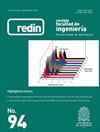学习编程和认知情绪:性别分析
IF 0.5
Q3 ENGINEERING, MULTIDISCIPLINARY
Revista Facultad De Ingenieria-universidad De Antioquia
Pub Date : 2020-11-04
DOI:10.19053/01211129.v29.n54.2020.12034
引用次数: 1
摘要
编程课程经常变成高遗弃率的课程,有时,导致一个因素驱使学生放弃他们的职业,即使这些课程与计算机科学、IT和相关职业领域的工程师培训高度相关。这些课程需要高度的认知过程,它会产生一些与学习相关的情绪,当考虑和评估时,可以用来促进学习。编程课程在女生中产生负面情绪的比例高于男生,甚至可能导致她们放弃职业,扩大性别差距。近年来,人们对情感在大学学术环境中的作用越来越感兴趣,也越来越想知道女性在计算机领域参与度低的原因,尽管她们的角色和技能很重要。然而,对分析学生在学习编程时产生的情绪的兴趣是最近才出现的。关于女性学习编程时的情绪的研究并不多。本研究的目的是分析学生在情感层面上对不同大学的行为。圣布埃纳文图拉大学(Cali-Valle del Cauca,哥伦比亚)。2博士学位哥斯达黎加国立大学(埃雷迪亚,哥斯达黎加)。mcoto@una.ac.cr。3哥伦比亚考卡大学博士学位(Popayán-Cauca,哥伦比亚)。ccollazo@unicauca.edu.co。4格拉纳达大学博士学位(格拉纳达,España)。patricia@ugr.es。ORCID: 0000-0001-6626-9633学习编程和认知情绪:一个性别分析回顾学院Ingeniería (Rev. Fac。荷兰国际集团(Ing))。第29卷(54),e12034。2020. Tunja-Boyaca,哥伦比亚。L-ISSN: 0121-1129, e-ISSN: 2357-5328, DOI: https://doi.org/10.19053/01211129.v29.n54.2020.12034教学活动,建立性别水平比较,并考虑纳入合作和游戏化的元素,以识别这些活动所产生的情绪差异。本文章由计算机程序翻译,如有差异,请以英文原文为准。
Learning about Programming and Epistemic Emotions: A Gendered Analysis
Programming courses often turn into courses with high percentage of desertion and, sometimes, result in a factor that drives students to abandon their careers, even when they are subjects highly relevant in the training of engineers in the areas of computer science, IT, and related careers. These courses demand high cognitive processes, which generate several emotions learning-related that, when taken into account and evaluated, could be used in favor of learning. Programming courses generate negative emotions in female students in a higher proportion than men, which may even lead them to abandon the career, widening the gender gap. In recent years, there has been a growing interest in the role of emotions in academic environments at university level, as well as for knowing the reason for the low participation of women, despite the importance of their role and skills, in computing areas. However, the interest in analyzing the emotions that emerge from students as they learn to program is quite recent. There is not an important number of studies around the emotions of women while they learn to program. The objective of this study is to analyze the behavior -at an emotional levelof students towards different 1 M Sc. Universidad de San Buenaventura (Cali-Valle del Cauca, Colombia). ORCID: 0000-0002-7118-2038 2 Ph. D. Universidad Nacional de Costa Rica (Heredia, Costa Rica). mcoto@una.ac.cr. ORCID: 0000-00024558-3671 3 Ph. D. Universidad del Cauca (Popayán-Cauca, Colombia). ccollazo@unicauca.edu.co. ORCID: 0000-00027099-8131 4 Ph. D. Universidad de Granada (Granada, España). patricia@ugr.es. ORCID: 0000-0001-6626-9633 Learning about Programming and Epistemic Emotions: A Gendered Analysis Revista Facultad de Ingeniería (Rev. Fac. Ing.) Vol. 29 (54), e12034. 2020. Tunja-Boyacá, Colombia. L-ISSN: 0121-1129, e-ISSN: 2357-5328, DOI: https://doi.org/10.19053/01211129.v29.n54.2020.12034 teaching activities, establishing gender level comparisons, and considering the incorporation of elements of collaboration and gamification to identify differences in the emotions originated by these activities.
求助全文
通过发布文献求助,成功后即可免费获取论文全文。
去求助
来源期刊
CiteScore
2.00
自引率
0.00%
发文量
27
审稿时长
2 months
期刊介绍:
Revista Facultad de Ingenieria started in 1984 and is a publication of the School of Engineering at the University of Antioquia.
The main objective of the journal is to promote and stimulate the publishing of national and international scientific research results. The journal publishes original articles, resulting from scientific research, experimental and or simulation studies in engineering sciences, technology, and similar disciplines (Electronics, Telecommunications, Bioengineering, Biotechnology, Electrical, Computer Science, Mechanical, Chemical, Environmental, Materials, Sanitary, Civil and Industrial Engineering).
In exceptional cases, the journal will publish insightful articles related to current important subjects, or revision articles representing a significant contribution to the contextualization of the state of the art in a known relevant topic. Case reports will only be published when those cases are related to studies in which the validity of a methodology is being proven for the first time, or when a significant contribution to the knowledge of an unexplored system can be proven.
All published articles have undergone a peer review process, carried out by experts recognized for their knowledge and contributions to the relevant field.
To adapt the Journal to international standards and to promote the visibility of the published articles; and therefore, to have a greater impact in the global academic community, after November 1st 2013, the journal will accept only manuscripts written in English for reviewing and publication.
Revista Facultad de Ingeniería –redin is entirely financed by University of Antioquia
Since 2015, every article accepted for publication in the journal is assigned a DOI number.

 求助内容:
求助内容: 应助结果提醒方式:
应助结果提醒方式:


